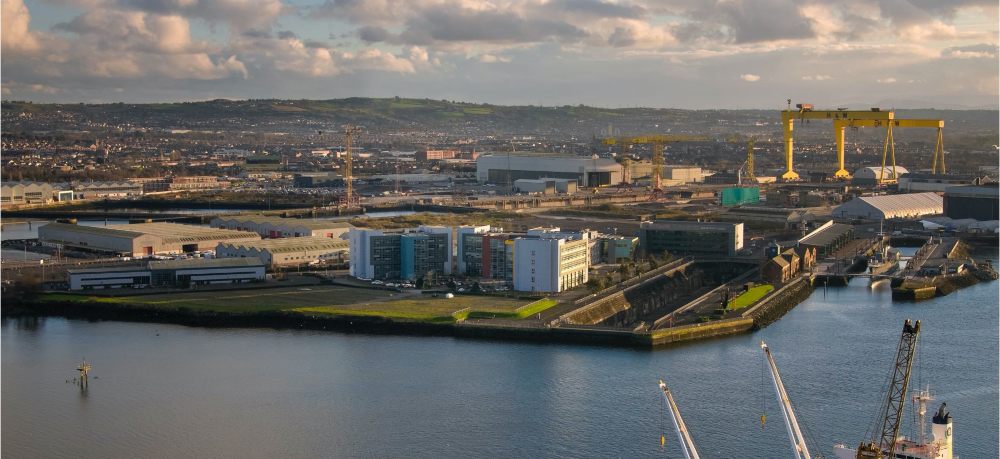Vikela Armour has developed a way to produce flexible, lightweight armour that could protect lives and equipment long into the future.
Headed by Belfast engineering graduate Peter Gilleece, Vikela Armour has devised a way to create a new kind of body armour that is lighter, more comfortable and that provides better protection than conventional flak jackets on the growing number of battlefields around the world.
That is just one application. The material and process behind it could be used in a wide array of industries and situations from protecting machinery and people in hazardous environments from mines to fires.
“The important thing to realise is the production and manufacturing process is our product”
It is no surprise to learn that last year Vikela Armour was named the overall winner of INVENT 2022, the competition for innovative start-ups in Northern Ireland that is run by the Catalyst innovation hub, which operates from Belfast and Derry.
Gilleece explained to ThinkBusiness how Vikela came about while he was in his final year of doing a Master’s degree at Queen’s University Belfast. “I guess I always wanted to create my own business, but I never knew what it was going to be.”
At 17 Gilleece rebuilt an old Mini from scratch, a feat that landed him a work placement with carmaker Aston Martin while he was at college.
Material instinct
Gilleece had a fascination with materials and his Master’s thesis was around turning chicken feathers into plastic. It was just one idea of many that Gilleece worked on and he became adept at winning various student start-up competitions ranging from £500 in prize money in 2019 up to £26,000 last year as part of the Invent competition for his body armour concept.
I met Gilleece at the Catalyst Innovation Hub in Belfast, formerly the Northern Ireland Science Park, where I meet a number of promising start-ups including horse nutrition business EquiNutritive and TriMedika, a medtech that has developed a next-generation non-contact thermometer technology.
INVENT is an annual competition that celebrates Northern Ireland’s most exciting innovators and entrepreneurs. Currently more than 900 entrepreneurs are working with Catalyst across various programmes. Some 2,700 tech professionals work between Derry and Belfast and a community of 570 business mentors and experts are collaborating with start-ups and scale-ups.
After graduating from university in 2020, Gilleece focused on developing his armour concept having noted the sheer number of deaths caused by improvised explosive device (IED) attacks in Afghanistan. The majority of the injuries among coalition forces were due to shrapnel coming from IEDs.
Gilleece reasoned that existing body armour leaves the head, arms and legs completely exposed and this is a problem that also impacts landmine clearance charities and other organisations working in dangerous environments and situations. Not only that but soldiers who have to carry 45kg of equipment, often in hot climates, suffer from exhaustion.
By experimenting with different materials and fibres and developing a patent-pending machine and manufacturing process, Gilleece has developed a material that can be applied in military and industrial applications to safeguard people and equipment.
“When I graduated in 2020 I knew that I wanted to set up my own business and I knew there weren’t any particular jobs I wanted to take on, so I decided to progress with this.”
One of his hobbies is long-range shooting and he is familiar with the amount of equipment soldiers have to carry and how they need flexibility when they have to go prone or move with speed. There is also the reality that people come in all shapes and sizes and the one-size-fits-all approach to flak jackets is not realistic.
Intellectual property
The composition of Vikela Armour’s technology is top secret and a lot of work has gone into protecting the intellectual property (IP) behind it. “We have custom-built a machine that can effectively print the armour.”
“Our material is 70% lighter than today’s ceramic armour. It gives you manoeuvrability and protection”
It is envisaged the patent-pending technology could deliver Vikela Armour revenues in the form of royalties from a percentage of licensed production. “The applications are not only military, the lightweight material could be used in automotive situations to protect vehicles and their components while ensuring the cars are kept lighter and faster.”
Similarly the material could be used to protect helicopters and airplanes.
Describing the material, Gilleece said it has better protection than today’s ceramic-based armour but is more flexible and lightweight so it could be worn to protect or cover more of the body.
“I’d like to see it being worn by people in situations where safety is paramount, not just by soldiers but paramedics who often get attacked while doing their job. The material could be used to create future paramedic, police or firefighter uniforms that offer protection but with less rigidity or weight of today’s armour.
“Our material is 70% lighter than today’s ceramic armour. It gives you manoeuvrability and protection.”
Looking to the future, Gilleece would like to see Vikela Armour set in train events that will re-establish Northern Ireland’s manufacturing prowess. “I aim high, hoping to be decently big.”
He explained that Vikela is focusing initially on the self-protection aspect of the material such as anti-stab garb for police forces and paramedics but admitted the military are taking an interest.
“The important thing to realise is the production and manufacturing process is our product.”
Crucially, the material can have a myriad of uses from safety in kitchens, protecting small animals in parks, offering a new way to defend against roof leaks or protecting the undercarriage of electric vehicles. “I can apply this to so many different things, from aerospace to automotive, there are so many aspects to it.”
“I would like to see this new technology set down an anchor for manufacturing in the North by creating skilled jobs for people.”





